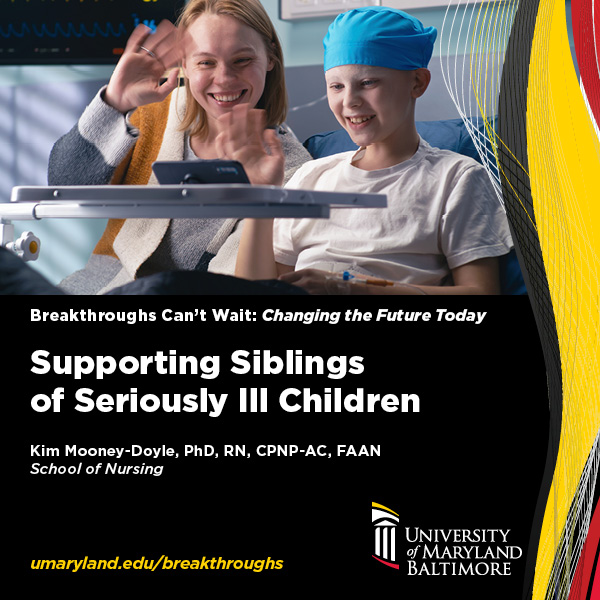At the University of Maryland, Baltimore (UMB), groundbreaking discoveries happen every day — transforming medicine, improving health, and shaping the future. From changing legal policy to pioneering treatments to cutting-edge scientific breakthroughs, UMB researchers are tackling real-world challenges and making a lasting impact on lives everywhere.
In our “Breakthroughs Can’t Wait: Changing the Future Today” series of videos, we will dive into inspiring stories of innovation from across UMB’s seven schools. See how scientists, doctors, and experts are addressing today’s most pressing issues — fueled by the critical support of government funding that drives progress forward.
Nearly 200,000 children and adolescents in the United States have a brother or sister with a life-limiting illness. These siblings face unique challenges that often go unseen.
Kim Mooney-Doyle, PhD, RN, CPNP-AC, FAAN, associate professor at the University of Maryland School of Nursing, explained that siblings of seriously ill children experience “dual losses.” They not only lose the companionship and guidance of a close friend when their sibling is hospitalized or dies, but they also face disruptions in their bond with parents whose attention is pulled between caregiving for the sick child and supporting their other children.
As a result, siblings of seriously ill children can face anxiety, depression, academic struggles, risky behaviors, and social isolation. Teens are especially vulnerable, often keeping quiet because they see their parents already overwhelmed. Yet research on how families communicate during a child’s illness — and how health systems can support them — has been limited.
Mooney-Doyle’s research seeks to change that. By examining how families communicate and what siblings and parents say they need, she aims to build family-based interventions that alleviate the risks siblings of seriously ill children face, to reduce distress for all family members, and to foster resilience.
“What parents taught us in my early studies was, ‘Help me to help my family,’ ” she said, explaining that parents often say they know how to care for their seriously ill child, but they’re left wondering how to support their other children. “What my research does is to shine the light on what those parents and siblings need and prefer and to use that evidence to then create programs or interventions that are feasible and effective.”
In a new video Q&A, Mooney-Doyle shows how meeting siblings’ needs helps entire families emerge stronger when facing serious pediatric illness.
